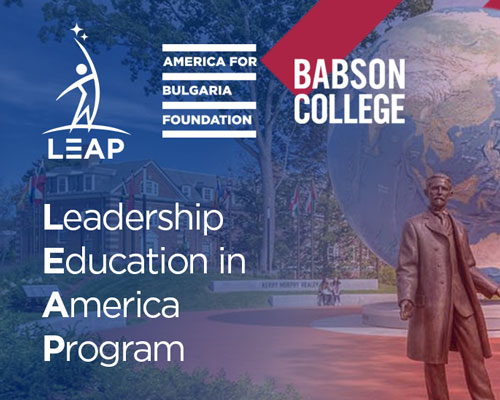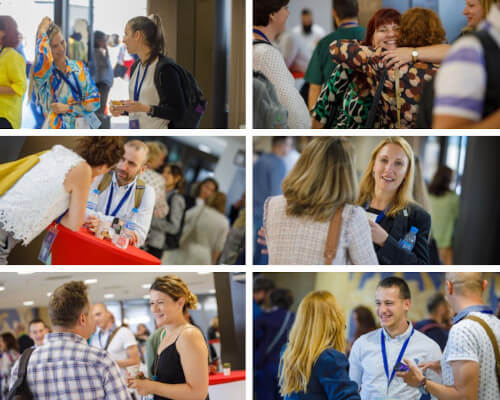Thirty of Bulgaria’s best and brightest university students spent an intense two-week immersion in the world of entrepreneurship this summer in a new program planners hope will prove nothing short of transformational for the students and their countries.
They were the first to participate in the Kenan Institute’s new Born-Global Entrepreneurship Program. The curriculum combines skills-based instruction, practical application, and interaction with highly successful entrepreneurs in a format designed to both inspire and prepare them to become successful global entrepreneurs.
“We know that entrepreneurs can have a tremendous impact on their communities,” said Raymond Farrow III, executive director of the Kenan Institute, who developed the program.
“We also know that today’s globally connected economy offers opportunities to propel new ventures in ways we are only beginning to tap,” he said. “Our goal is to use what we know about both to help students learn to create global ventures that can literally change the trajectory of their lives and their country.”
Best hope for an emerging economy
The Kenan Institute’s Born-Global program is one of three modules of the Summer Entrepreneurship Program (SEP), a component of the Bulgarian Young Leaders Program, launched in the summer of 2010.
Offered by the Institute of International Education (IIE) and sponsored by the America for Bulgaria Foundation, the program seeks to develop a generation of young Bulgarians capable of thinking and acting on a global level and committed to building their country’s economy and civil society.
The students, all in their second or third year of college, spent five weeks in the United States learning the fundamentals of entrepreneurship from business leaders and experts in Boston, Chapel Hill, and New York. Participants developed career and business plans for how they would apply what they learned when they returned home.
“Bulgaria has been going through a painful process of transitioning from Communism to a free-market economy for the past 20 years,” said Emil Levy, IIE program manager for the Bulgarian Young Leaders Program. “The goal of the Summer Entrepreneurship Program is to develop entrepreneurs who can revitalize and bring new dynamism to Bulgaria’s economy and create jobs.”
Opening students’ eyes to opportunities for impact
The UNC component of the SEP was responsible for teaching students how to turn their ideas for new ventures into viable business plans and to develop networking and presentation skills that are critical for them to succeed.
For Farrow, SEP presented an opportunity to do more. He wanted to not only teach the basics of venture creation in an intensive two-week format, but also to change the way students viewed themselves and the contributions they could make through creating successful ventures.
“It is one thing to teach someone how to launch a new businesses or nonprofit,” Farrow said. “It is quite another to open students’ eyes to the potential they hold to help their communities grow and flourish in the process.”
The “born-global” focus offered the additional opportunity to promote a concept that is ripe with opportunity.
“There are lots of programs that promote and teach entrepreneurship,” Farrow said. “But teaching how to launch new ventures with a global component right out the gate is an area that deserves more attention.”
Instructors at UNC first took the SEP students step-by-step through each phase of the venture-creation process. Students then applied what they learned through an innovative business-planning workshop model designed and led by UNC Center for Entrepreneurial Studies director Ted Zoller.
Farrow overlaid the instruction and workshop components with opportunities for students to hear and interact with entrepreneurs and experts who have achieved success and used it to benefit others.
UNC alumnus Amit Singh described his experience launching a born-global technology consulting company, Spectraforce Technologies, in 2004. It was named one of Inc. magazine’s 500 fastest-growing companies in 2009. Singh now gives back to UNC as a coach and mentor, helping develop the next generation of entrepreneurs.
Social entrepreneurship expert James H. Johnson, Jr., director of the Kenan Institute’s Urban Investment Strategies Center, described his work helping create a model school for at-risk youth that is transforming a depressed inner-city community.
Bull City Forward founder Christopher Gergen described the incubator he and others have created to accelerate the creation, scale, and impact of social enterprises in Durham, N.C.
Students visited Asheville, N.C., to learn firsthand from people in that community how they sparked a cultural and economic renaissance by supporting entrepreneurs in the arts, music, and tourism.
They also heard from young founders and executives of prominent commercial and social enterprises launched by UNC students while still in school, such as Carolina for Kibera, a UNC nonprofit fighting poverty and violence in the Kibera slum of Nairobi, Kenya, and iContact, a leading national e-mail marketing platform whose CEO, Ryan Allis, is founder of a socially responsible investment fund, called Humanity Fund.
“The hope is that students will see these young people come in wearing jeans and flip flops and start to realize they don’t have to be 45 and wearing a tie to have impact,” Farrow said.
Levy says the direction taken by the UNC program speaks clearly to the goals of the program’s sponsor.
“We hope that when the students return to Bulgaria with all of this knowledge and training, they will start a transformation, a revolution,” Levy said.
Students’ perspective shifts
It is both symbolic and significant that most SEP students were born in 1989, the year the Iron Curtain fell.
“They are very much citizens of the world because of the Internet and the free-market system they have always lived in,” Levy said. “They don’t have the mentality associated with the old ways. Our sponsor, the America for Bulgaria Foundation, believes you need to start with young people to spark a cultural change.”
Comments from the SEP students indicate the UNC experience has helped that change begin.
“I think I will apply what I learn here the rest of my life,” said Elena Ilieva, a third-year business administration student at the American University in Bulgaria.
Ilieva and students who worked on five of the six business-planning teams at UNC have continued work on those plans after returning home. They plan to enter a business-plan competition in Bulgaria in May that could offer as much as $60,000 in prize money to seed the winning ventures.
“Perhaps we’ll win,” she said. Regardless, “I have the basics of how to structure a business plan and how to think about starting a venture. When I start working on starting my own business, I’ll definitely apply this.”
Vladimir Grachki said the program opened his eyes to how much he and others could accomplish.
“This might sound corny, but I think the most important thing I learned is that I can do so much more than I think,” said Grachki, an English language and literature student at South West University.
“Now I know what I want to do with my life,” Grachki said. “Now I have a purpose that I want to fulfill.”
What students say:
http://www.youtube.com/bylpglobal#p/a/u/2/25HBcIwMaHU
Learn more about Born-Global Bulgarian Young Leaders Program:
http://www.bornglobal.unc.edu/

